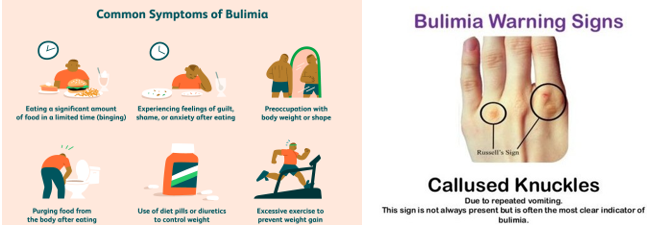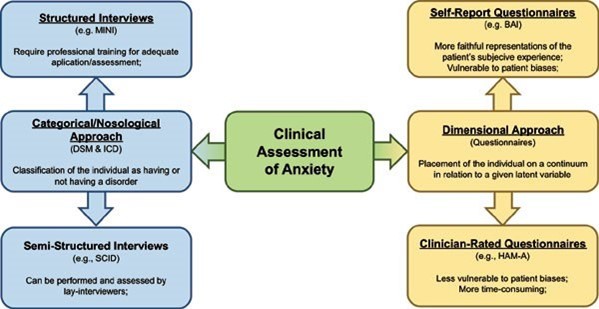Which is associated with bulimia nervosa?
Very low BMI
Decreased size of parotid glands
Calluses on the hands and fingers (Russell's sign)
Fluid and electrolyte overload
The Correct Answer is C
Russell’s sign is a physical symptom that is associated with bulimia nervosa. It refers to the presence of calluses on the knuckles or back of the hand that are caused by repeated self-induced vomiting.
Option a. Very low BMI is not typically associated with bulimia nervosa. People with bulimia nervosa may have a normal or above-normal BMI.
Option b. Decreased size of parotid glands is not associated with bulimia nervosa. In fact, people with bulimia nervosa may have an enlarged parotid gland due to repeated vomiting.
Option d. Fluid and electrolyte overload is not typically associated with bulimia nervosa. People with bulimia nervosa may experience fluid and electrolyte imbalances due to repeated vomiting and laxative abuse.

Nursing Test Bank
Naxlex Comprehensive Predictor Exams
Related Questions
Correct Answer is C
Explanation
Buspirone and benzodiazepines are both medications used to treat anxiety disorders, but they work in different ways. Benzodiazepines like Xanax work by enhancing the effects of a neurotransmitter called GABA, which can produce a sense of relaxation and calmness. However, benzodiazepines can also cause dependence, tolerance, and withdrawal symptoms when used for a prolonged period.
On the other hand, buspirone works by binding to serotonin and dopamine receptors in the brain, which can reduce anxiety. Unlike benzodiazepines, buspirone does not cause dependence, tolerance, or withdrawal symptoms, which makes it a safer option for long-term treatment of anxiety disorders.
Therefore, the healthcare provider may have prescribed buspirone instead of alprazolam because it is a safer alternative for long-term use, especially for individuals who have a history of substance abuse or dependence. The nurse should explain the benefits of buspirone and address any concerns the client may have about the medication.

Correct Answer is C
Explanation
This response acknowledges the client's concerns and invites further discussion about their experience. The nurse can use this information to assess the severity and duration of the client's symptoms, as well as any potential triggers or stressors that may be contributing to their anxiety and inability to concentrate.
Option a "Have you talked to your friends about this yet?" may not be an appropriate response, as the client may need more professional support than what their friends can provide.
Option b "I have problems too, everybody has problems" may be dismissive of the client's concerns and may not help them feel heard or understood.
Option d "Have you talked to your parents about this yet?" may not be an appropriate response, as the client may not feel comfortable discussing their concerns with their parents or may need more professional support than what their parents can provide.
Option e "Why do you think you are so anxious?" may be seen as confrontational and may not help the client feel heard or understood.
Option f "It sounds like you're having a difficult time" acknowledges the client's concerns but does not invite further discussion or provide an opportunity for the nurse to gather more information.

Whether you are a student looking to ace your exams or a practicing nurse seeking to enhance your expertise , our nursing education contents will empower you with the confidence and competence to make a difference in the lives of patients and become a respected leader in the healthcare field.
Visit Naxlex, invest in your future and unlock endless possibilities with our unparalleled nursing education contents today
Report Wrong Answer on the Current Question
Do you disagree with the answer? If yes, what is your expected answer? Explain.
Kindly be descriptive with the issue you are facing.
